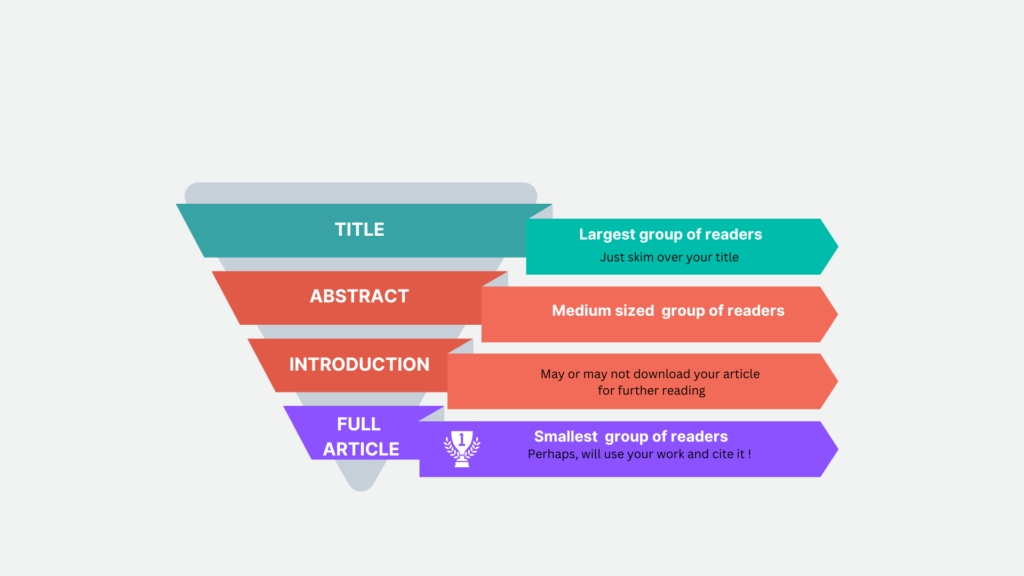While writing an academic paper researchers often spend most of their time on the “meat” of the article i.e. materials and methods, results and discussions. However, very little well thought effort goes into the title, abstract and keywords. Surprisingly, these three elements – title, abstract and keywords are the vital elements that pave the way to publication success. The keywords, title and abstract works like a tag team. Proper keywords make your scientific paper searchable, an effective title can lasso the people successfully
and draw their attention. The abstract further triggers the readers’ interest and invites them to read the whole paper. Therefore, it is critical to come up with a notable title for your scientific article.
Why a good title is important for your scientific article?
The title of any manuscript serves two fundamental purposes: it identifies the primary topic or point of the paper and it attracts readers. A title can be compared as a door in the communication of research.
While searching scientific databases, readers come across first your research paper titles. Based on the title, they deduce what your paper is about and it’s relevance to them. Given this, it is explicit that
the title of your paper is the most important determinant of how many people will read it.

What makes a “good” title?
A good title must include all the important information that will signal to your readers that they should keep reading. Good research paper titles are typically 10–12 words long. It should contain proper
descriptive terms and phrases that accurately highlight the core content of the paper. Here are some tips to help you writing a strong title for your scientific article.
Headline your key result:
If your work has a clear key finding that can be summarized in a sentence then put in the title. A title that states your finding is more interesting and informative than a title describing your approach. For example:
- Main effort (not optimal): Effect of in-Process Laser Heating on Surface Finish in Polymer Additive Manufacturing.
- Main result (preferred): Improvement of surface quality by in-Process Laser Heating in Polymer Additive Manufacturing
Place the most important words first:
Use the most crucial words first to grab readers’ attention. Start with terminology you believe will pique readers’ curiosity, such “variables.” Then elaborate on the study’s theme using the less significant words.
Use appropriate keywords for the title of your scientific article:
You must use proper keywords to hightlight the content of your manuscript. In order to make it easier for readers to find your article, include keywords that can be recognized, indexed, and retrieved by a database search.
Keep your title short:
You should make your title concise so that a reader can do a quick skim over it. While searching for relevant articles in online databases, most of the readers just scan over it for seconds and then decided whether to download it or not.
Use appropriate descriptive words:
Apart from using the appropriate keyword, think about terms that people would use to search for your work and include them in your title.
Avoid using acronyms and jargons:
Do not use acronyms or scientific jargons in the title. You should always write your title in such a way that anyone can read it regardless of their expertise. However, the only exception can be done when you are
including standard acronyms or common jargons.
Avoid punctuation:
Avoid using exclamatory or question marks. This just makes your title flimsy. You will some pepole use colon or hyphen, but this added punctuation often hints that your title could be more concise.
Do not sensationalize your research:
You should let the readers decide whether your work is noble or not. Do not use terms such as novel or first time unless you are absolutely sure no one has published anything similar. These terms are red flags for reviewers and editors. Make sure you can deliver on your title.
To conclude, writing an effective title that will hook reader is always challenging; especially when you are novice writers. You should always put forth some well thought effort to come up with a great title for your scientific article.
Disclaimer: No A.I. was used to generate any portion of this write up.


Pingback: How to Write Research Proposal for Research Based PhD Program
Pingback: How to Write an Abstract for Your Research Paper?
Pingback: How to Adapt Your Thesis into Journal Article? - gradbunker.com
Pingback: How to Write a Research Paper using IMRaD Format? - gradbunker.com